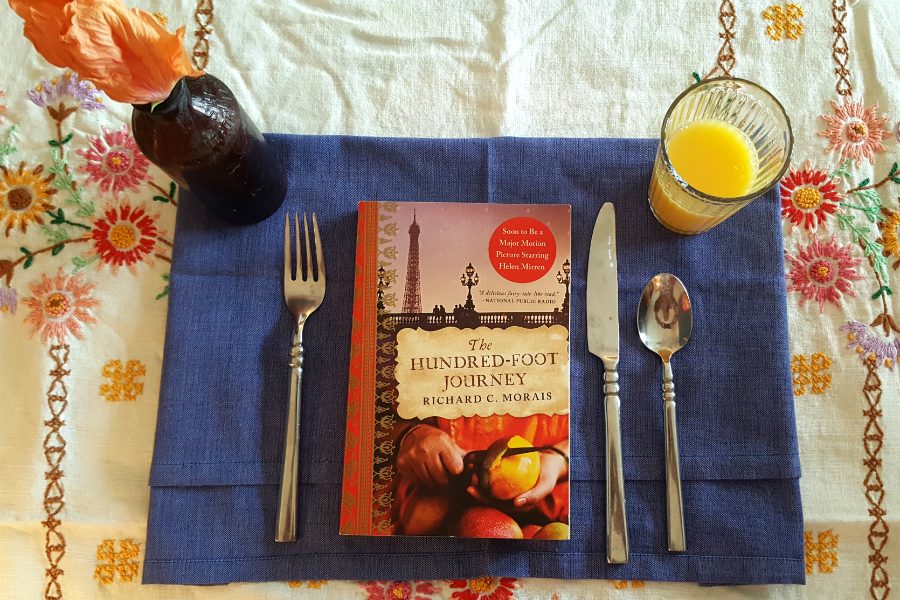Book Review: “The Hundred-Foot Journey” by Richard C. Morais
“Ratatouille” meets Bollywood in this delectable page-turner.
“The Hundred-Foot Journey” by Richard C. Morais.
Disclaimer: This review includes some spoilers. Proceed with caution.
Over Winter Break, I wandered into a seemingly neverending bookstore in Chicago called “Myopic.” The used bookstore is wedged in between a bar and a tarot-reading lounge along Milwaukee Avenue in West Town. I was soon enticed by the rows upon rows of books that lined the shop’s three soaring floors of shelves. As a self-titled Book Enthusiast, I found comfort in recognizing familiar titles of books I had already devoured, and a bevy of new titles I eagerly explored.
The vast majority of my break was spent hunched over college applications, and I was on the hunt for a new book to distract me from my collegiate stress. My only qualification was the book must be easy to read. I wanted a sense of accomplishment during my brief stint in Chicago, and what would be more redeeming than finishing a novel?

The used bookstore, Myopic, in Chicago.
As I browsed through the shelves, I was intrigued by a blood orange book spine with gold decal. I recognized the title, The Hundred-Foot Journey, as I had watched the movie last summer. Because I enjoyed the film (based on the book) so much, I hoped Richard C. Morais’ written words would be just as captivating, plus a quick read.
The Hundred-Foot Journey centers around Hassan Haji, a boy from Mumbai. At a young age, Hassan and his family move to Lumiére, a village in the French Alps, to pursue success in the fine-dining industry. As Hassan matures, his family and their neighbor, the renowned cook Madame Mallory, quickly realize Hassan possesses a special talent for cooking. The book follows Hassan as he experiments with traditional Indian food as well as pursues the unfamiliar cooking techniques of the French.
Any reader of The Hundred-Foot Journey will be drawn to the intricate descriptions embedded in the text. Morais has a knack for granting the reader a picturesque and charming sense of setting. He plays into the five senses: touch, hearing, vision, and, more importantly, smell and taste. Especially taste.
Fair warning: this book will make you hungry. Almost every page is packed full of mouth-watering details of citrus pastries, curried fish, and steamed couscous with tangy dressing. Foodies such as myself will rejoice in the mini cookbook included at the end of the novel.
As for plot, The Hundred-Foot Journey falls nothing short of a fairy tale. Hassan whips up lavish cuisine easily with his inborn expertise, dates the most desired women, and, as his family happens to own a few millions, he is never short on cash. While Hassan is faced with some minor setbacks, one including the ongoing feud between his family and Madame Mallory, almost every opportunity is hand-delivered to Hassan on a silver platter. Even the author remarks on the lack of adversary:
“If I am honest, my rise in Paris over the next twenty years, it was not as difficult as one would suspect. It was as if some unseen spirit were clearing obstacles and helping me take the path that I believe was always destined for me.”
There are plot holes that readers like myself may find confusing — paragraphs thrown in here and there that are meant to connect the main ideas. I found some of these ideas weak, such as when the Haji family leaves London because (spoiler) they catch Hassan making out with his older cousin. Why does Hassan’s older cousin prey on younger family members? I asked myself. Why is this not more thoroughly explained? We never know.
Further, I am a sucker for a happy ending and a sense of closure when the last page arrives. While I believe the vague ending is intentional of Morais, the reader is left with questions.
All in all, I would rate The Hundred-Foot Journey a 6/10. I regret not reading the novel before watching the movie; I adore the film, starring Helen Mirren and Manish Dayal. (Manish, if you are reading this, you are perfect.) And truth be told, I prefer the finale of the movie.
Bottom line: I thoroughly enjoyed reading the book. It is humorous, cheerful, and endearing — plus it provided nice breaks in between writing college essays. The style of writing and the descriptions are beautiful and flow smoothly. I found Hassan’s teenage character relatable and down-to-earth (although he is very, very lucky). I recommend people of every age read The Hundred-Foot Journey; this page-turner is a nice way to spend a cold weekend inside, learning to cook onion bhaji while cheering on Hassan on as he produces dish after dish of culinary masterpieces.
Your donation will support the student journalists of Iowa City High School. For 2023, we are trying to update our video and photo studio, purchase new cameras and attend journalism conferences.

Regina Regal and professional sleuth Lucy Wagner has slithered her way into the hallways of City High. Somehow, Wagner has also found her way into the...






























